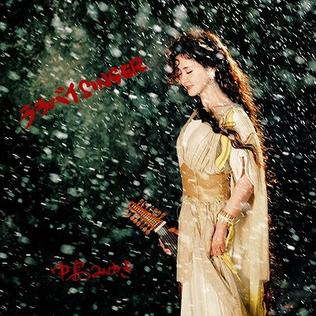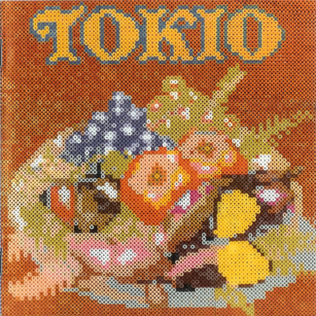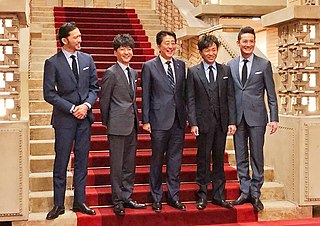
"Bokura no Machi de" is the third overall single by the Japanese boy band KAT-TUN, and the second from their second studio album, Cartoon KAT-TUN II You. The first ballad to be released as a single, it is also the first commercially released song to not feature Jin Akanishi who took a sabbatical from the group in October 2006 to study in Los Angeles. The single was released in three editions; a regular edition with instrumental versions of the title track and a b-side, a first press limited edition with a bonus track and its instrumental version and a limited edition with the single's music video.

Sugar is the eleventh studio album by Japanese band Tokio. It was released on February 20, 2008. The album peaked at sixth place on the Oricon weekly charts and charted for six weeks.

Lullaby Singer is the 34th studio album by Japanese singer-songwriter Miyuki Nakajima, released in November 2006.

Zeitakubyō is the first full-length album by the Japanese rock band One Ok Rock, released on November 21, 2007. It peaked at No. 15 on the Oricon weekly chart and charted for 22 weeks before dropping out.

Beam of Light is the second full-length album by the Japanese rock band One Ok Rock, released on May 28, 2008. It reached No. 17 on the Oricon weekly chart, and charted for six weeks before it dropped out.

Kanjō Effect (感情エフェクト) is the third full-length album by the Japanese rock band One Ok Rock, released on November 12, 2008. It reached No. 13 on the Oricon weekly chart and charted for 15 weeks before dropping out. This was the last album to feature original lead guitarist Alex Onizawa.

Harvest is the tenth studio album by Japanese band Tokio, released on October 18, 2006. It is one of Tokio's most successful albums, having peaked at second place on the Oricon weekly charts and charted for eighteen weeks.

5 Ahead is the seventh studio album by Japanese band Tokio. It was released on December 5, 2001. It was the first album to be released under Universal Music Japan. The album reached eighth place on the Oricon weekly chart and charted for six weeks.

Best EP Selection of Tokio II is the second compilation album by Japanese band Tokio. It was released on May 9, 2001. It is the band's second of three compilation albums, with the first being, Best E.P Selection of Tokio. It reached sixth place on the Oricon weekly chart and charted for nine weeks.

Blowing is the third studio album by Japanese band Tokio. It was released on March 25, 1996. The album reached seventh place on the Oricon weekly chart and charted for six weeks.

Bad Boys Bound is the second studio album by Japanese band Tokio. It was released on July 3, 1995. The album reached fourth place on the Oricon weekly chart and charted for four weeks.

Tokio is the debut eponymous album by Japanese band Tokio. It was released on November 21, 1994. It reached eighth place on the Oricon weekly chart and charted for thirteen weeks.
Tokio Remix is the first remix album by Japanese band Tokio. It was released on March 8, 1995. The album reached ninth place on the Oricon weekly chart and charted for five weeks.

"Sorafune"/"Do! Do! Do!" is a double A-side single by the Japanese boy band Tokio, released on August 23, 2006. It is the thirty-sixth release for the group, and also has been their most commercial successful effort after their 1995 best-selling debut single "Love You Only".
"Seisyun" is the thirty-ninth single by the Japanese band Tokio, released on November 28, 2007. It topped the Oricon weekly charts and charted for twelve weeks. The song "Seisyun" was used as the theme song to Utahime, a drama show Tomoya Nagase starred in.

"Haruka" is the forty-third single by the Japanese band Tokio. It was released on February 3, 2010 under the label J Storm. The single topped the Oricon weekly singles chart. The songs "Haruka" and "Dash Village" are being used as theme songs for the Dash Beach and the Dash Village respectively, both segments on Tokio's long-running variety show, The Tetsuwan Dash. The Dash Village theme was originally composed by Tokio's lead singer Tomoya Nagase just shortly after the village itself was built in 2000. It has been used as the main theme since, though the version on this single is a re-recording.

17 is the twelfth studio album by Japanese band Tokio. It was released on 22 August 2012. The album peaked at fifth place on the Oricon weekly charts, and remained in the charts for five weeks.

"Amagasa" is a song by Japanese band Tokio. It was one of the two A-sides that composed the band's 39th single, along with the song "Akireru Kurai Bokura wa Negaō". The single was released on September 3, 2008, and was their first release with J Storm. "Amagasa" was written by Japanese rock musician Ringo Sheena. In 2014, Sheena covered the two songs she wrote for the single, "Amagasa" and "Kachū no Otoko", for her album Gyakuyunyū: Kōwankyoku.

















